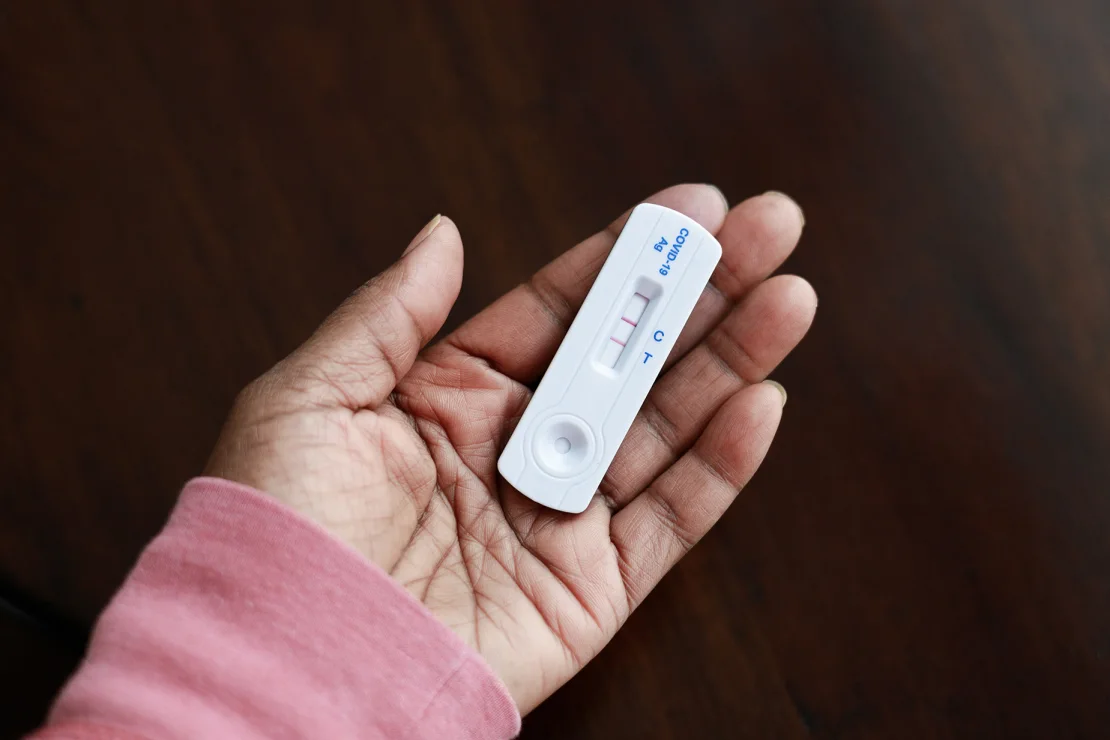News
What you should know about new coronavirus variant? A doctor’s perspective

There is a new coronavirus variant in town. KP.2, a member of the so-called FliRT variants, nicknamed after their mutations, has become the dominant coronavirus strain in the United States, according to the US Centers for Disease Control and Prevention. These FliRT variants have certain mutations in common but are still part of the Omicron family of the coronavirus.
For the period from April 28 to May 11, nearly 30% of new cases were caused by KP.2, up from less than 16% in the two-week period before that.
What should people know about this new variant? What are the symptoms of infection? Do vaccines still work against the new strain? Is a home test still reliable? How long should people isolate if they contract KP.2? Who should take antiviral treatments if they contract this type of Covid-19? And what is the guidance for immunocompromised individuals — should they start masking again?
To guide us through these questions, I spoke with CNN wellness expert Dr. Leana Wen. Wen is an emergency physician and clinical associate professor at the George Washington University. She previously served as Baltimore’s health commissioner.
Home tests will likely still detect KP.2, the new coronavirus variant. Grace Cary/Moment RF/Getty Images
CNN: What should people know about this new variant, KP.2?
Dr. Leana Wen: Since the start of Covid-19, we have been discussing new variants. The original strain of the virus was displaced by the Alpha variant. Then we had Beta, then Delta and then Omicron.
KP.2 is part of the Omicron family. It appears to be displacing JN.1 and similar subvariants, which previously were the dominant variants in the United States.
Whenever there is a new variant, there are three key questions to ask: Is it more contagious? Does it cause more severe disease? And do existing vaccines and treatments work on it?
One reason a new strain displaces the previously dominant ones is that it is as contagious or more so. That means KP.2 could spread very easily, which is something we have seen throughout Covid-19: that the coronavirus is extremely contagious and thus difficult to avoid.
The good news is that KP.2 does not appear to cause more severe disease. Indeed, hospitalizations associated with Covid-19 are at record lows. And there is no reason to believe that existing vaccines and treatments would stop working against it.
CNN: What are the symptoms of infection with KP.2?
Wen: Most people who contract the coronavirus will never know what variant is causing their symptoms. Symptoms of Covid-19 infection include runny nose, sore throat, headache, fevers, cough and body aches. Some people may experience more severe symptoms such as shortness of breath. Covid-19 could also exacerbate underlying conditions such as heart failure.
None of these symptoms are specific to KP.2, which so far has not been reported to be associated with unique symptoms that distinguish it from other coronavirus infections. It’s important to remember that in many individuals, Covid-19 symptoms may be difficult to differentiate from other viral infections, such as the flu or common cold.
News
Spokesperson Warns Nigerians Against Fake Ministry Of Foreign Affairs Recruitment Scam

By Gloria Ikibah
News
CBN announces revised documentation requirements for PAPSS transactions

The Central Bank of Nigeria (CBN) has announced a revised documentation requirement for transactions conducted through the Pan-African Payment and Settlement System (PAPSS) in Nigeria.
This was disclosed in a statement issued by the apex bank’s acting Director, Corporate Communications, Mrs. Hakama Sidi Ali
The CBN said the new initiative is part of its ongoing commitment to foster seamless intra-African trade, financial inclusion, and operational efficiency for Nigerians engaging in cross-border payments within Africa.
Launched by Afreximbank in partnership with the African Union and the African Continental Free Trade Area (AfCFTA) secretariat in January 2022, PAPSS serves as a centralized payment and settlement platform that enables instant, secure, and efficient cross-border transactions throughout Africa.
By facilitating payments in local currencies, PAPSS minimizes reliance on third-party currencies, reduces transaction costs, and supports the rapid expansion of trade under the AfCFTA.
In a recent circular referenced TED/FEM/PUB/FPC/001/006 issued on April 28, 2025, CBN outlined the key changes to the documentation requirements associated with PAPSS transactions.
The key changes it added take effect immediately and include simplified documentation for low-value transactions, which allows customers to now use basic KYC and AML documents provided to their authorized dealer banks for low-value transactions of up to $2,000 and $5,000 equivalent in naira for individuals and corporate bodies, respectively.
“For transactions above the thresholds, all documentation as stipulated in the CBN foreign exchange manual and related circulars remains mandatory,” the bank said.
Also, the CBN added that applicants are responsible for ensuring all regulatory documents are available to facilitate the clearance of goods, as required by relevant government agencies.
“Authorized dealer banks may now source foreign exchange for PAPSS settlements through the Nigerian foreign exchange market, without recourse to the CBN.
“All export proceeds repatriated via PAPSS shall be certified by the relevant processing banks.
“The Central Bank of Nigeria urges all banks to adopt PAPSS and commence originating transactions in line with this new policy.
“In addition, CBN encourages exporters, importers, and individuals to familiarize themselves with the new requirements and leverage PAPSS for cross-border transactions within Africa,” the statement said.
News
Reps Set Stage for Nigeria’s First Legislative Conference on Renewable Energy

By Gloria Ikibah
The House of Representatives is set to host the country’s first National Legislative Conference on Renewable Energy, aimed at driving new laws, attracting investment, and pushing Nigeria further along its energy transition journey.
This was revealed during a press briefing by the Chairman, House Committee on Renewable Energy, Rep. Afam Victor Ogene, who described the event as a turning point for energy legislation in Nigeria.
He said: “The conference aims at bringing together key stakeholders and industry players to discuss renewable energy legislations, energy transition, renewable energy financing, investment opportunities and related matters.
“It’s about developing a national legislative framework on renewable energy”.
The conference, which is being organised by the House Committee on Renewable Energy in partnership with the Office of the Speaker of the House of Representatives, and the United Nations Development Programme (UNDP), will take place under the UNDP Parliamentary Development Program.
Rep. Ogene noted that recent legal reforms have created space for state governments to play a more active role in Nigeria’s power sector. He pointed to the Fifth Alteration Bill 2022 (No.33), now signed into law, which allows states to legislate on electricity matters within the national grid. Before now, states could only act on off-grid power.
In addition, he highlighted the Electricity Act of 2023, which came into effect in February 2024.
“It permits states to issue licenses for all electricity activities – generation, transmission and distribution across the entire power sector value chain,” he said.
The Committee Chairman further stated that the new National Integrated Electricity Policy, expected in 2025, will guide states in forming new electricity markets, where solar power and other renewable sources will be key to reaching underserved communities.
Ogene explained, “The conference has three clear objectives:
“To promote dialogue among legislators, experts and stakeholders on critical legislative priorities.
“To establish a coordinated platform for federal and state lawmakers, and to produce a clear, time-bound legislative action plan.
“International partners are also on board. The Inter-Parliamentary Union (IPU) will participate, and parliaments from South Africa, Ghana and Gambia have confirmed attendance. Ghana is sending a three-man delegation led by the Deputy Speaker, Rt. Hon. Alban Kingsford Bagbin”.
In another major highlight, the Netherlands-based platform INCLUDE will host a Pan-African Legislative Dialogue session on renewable energy, to be chaired by the Hon. Speaker, Rt. Hon. Abbas Tajudeen.
“The session will focus on how to establish a unified legislative framework on renewable energy development, investment and financing.
“The time has come for us to act. This is not just another conference – it is the foundation of Nigeria’s renewable energy future”, Ogene added.
Expected outcomes from the conference include new policy and legislative reform proposals to boost renewable energy use, as well as draft laws that will encourage public and private sector investment.
Other goals are to enhance collaboration between federal and state lawmakers, raise public awareness, and roll out a practical roadmap for implementation and progress tracking.
The event will also feature a technology showcase of renewable energy innovations and business opportunities.
-

 Metro10 hours ago
Metro10 hours agoGunmen storm University of Benin teaching hospital, kill doctor
-

 Politics23 hours ago
Politics23 hours agoJust in: Ex- Gov Okowa accepts betraying Southern Nigeria, laments running with Atiku
-

 Metro11 hours ago
Metro11 hours agoFCTA destroys 601 motorbikes over violations
-

 News11 hours ago
News11 hours agoJust in: FG declares tomorrow public holiday
-

 News23 hours ago
News23 hours agoBoko Haram Kill Mourners, Kidnap Others In Borno
-

 News2 hours ago
News2 hours agoAlleged money laundering: EFCC produces Aisha Achimugu in court
-

 News22 hours ago
News22 hours agoDeputy Speaker Leads Defection of PDP Stalwart Chris Igwe, 13,000 Followers to APC In Abia
-

 News4 hours ago
News4 hours agoJUST IN: Major General Paul Ufuoma Omu Rtd, dies at 84






